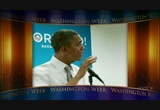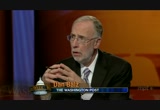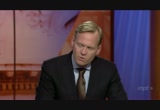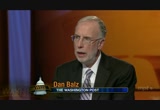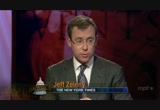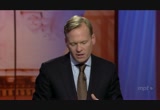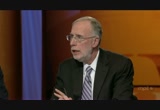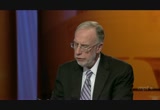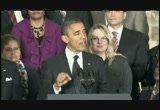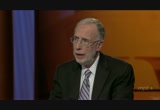tv Washington Week PBS November 9, 2012 9:35pm-10:00pm EST
9:35 pm
9:36 pm
the victory party was robust. >> a long campaign is now over. and whether i earned your vote or not, i have listened to you. i have learned from you. and you've made me a better president. gwen: a the thank yous were fervert. >> i'm really proud of all of you. it will go on in history. people will read about it it. and they'll marvel about it. >> as president obama claimed his second term. the election turned out to be a lesson in truth and consequences. what did the obama campaign do right and what did the romney campaign do wrong? >> and i ran for office because i'm concerned about americans. this election is over. but our principles endure. >> the voters have their say. leaving washington to search
9:37 pm
for a compromise even as a fiscal crisis looms. >> this is an opportunity for the president to lead. this is his. >> i'm open to compromise. i'm open to new ideas. i'm committed to solving our fiscal challenge. gwen: here to cover another historic week dan balz of "the washington post." john dickerson of cbs news. beth reinhard of "national journal" and jeff zeleny of "new york times." >> live from our nation's capital, this is "washington week" with gwen ifill. produced in association with national journal. corporate funding for "washington week" is provided by -- >> this rock has never stood still. since 1975 we've been there for
9:38 pm
our clients through good times and bad. through the years from insurance to investment management from real estate to retirement solutions. we've developed new ideas for the financial challenges ahead. this rock has never stood still. and that's one thing that will never change, prudential. >> wherever our trains go, the economy goes to life. norfolk southern, one line, infinite possibilities. >> additional corporate funding is provided by boeing.
9:39 pm
additional funding is provided by the an nenberg foundation, the corporation for public broadcasting and by contributions to your pbs station from viewers like you. thank you. >> once again, live from washington, moderator gwen ifill. gwen: good evening. two men faced off for what each said would be his final campaign competing for the hearts and the minds of an economically stressed electorate. president obama won the much discussed battleground states. he won the electoral vote. he won the popular vote of -- and he won an america that revealed itself to be more divided than ever. today the president walked into the east room saying elections have consequences. >> what the american people are looking for is corporation. they're looking for consensus. they're looking for common sense. most of all, they want action.
9:40 pm
i intend to deliver for them in my second term i expect to find willing partners in both parties to make that happen. so let's get to work. gwen: the obama campaign pieced together a electoral puzzle. how did they put it together? >> they had multiple paths to get to 270. they used almost all of them. they were able to through very focused data-driven ground operation identify their voters and successfully reassemble the coalition that they had in 2008. african americans, latino, -- latinos, young voters, women. would young voters turn out in the numbers they did before? in fact, they were by one point
9:41 pm
a higher percentage than they were in 2008. would african americans vote with the same enthusiasm compared to 2008? they did. it was 15%. this was a campaign that set its sights early and improving on what everybody thought was a very good ground operation and they exceeded it. gwen: in a very specific way, not in a broad base at all and not in a way that was out to persuade anyone who had not voted for them before. >> it was not much of a persuasion. they started with the baseline of the 2008 results. and then they had the census from 2010. they saw what had changed and who had moved around. and then it's the sole reason that jim mussina moved to chicago and started building this thing.
9:42 pm
it became obama for america. they were going door to door to door to just find new voters. i talked to the romney campaign. they found voters that we didn't know existed in hamilton county, ohio. they just did a much better job finding these people. and in fairness, they had more time. they didn't have a primary campaign to fight. they had a lot of time do -- to do this. gwen: i don't know how many stories i read about how much they thought they were going to win. >> they with so convinced they were going to win that somebody describe today me -- described to me that when they found they lost, it was like a death in the family.
9:43 pm
the "boston globe" said they had fireworks ready to go. why did they think they were going to win? they had a fundamentally different view of the elect tort. when the public polls came out they looked at these polls and said these polls have too many democrats. there's no way this president will be able to build up the enthusiasm that way. there are a lot of polls that were pretty close. and this person said that -- they said it was inconceivable. we thought there's no way he's going match his 2008 turnout with minorities and young voters an we really didn't think he would increase it. so what happened overall is, the president did worse with white voters but white voters were the same share of the elect tort. but he did far better with african-americans, latinos an young voters because the romney campaign had sort of was looking -- they changed their
9:44 pm
data. they done their internal polling based on a smaller number of democrats turning out. they thought things were going well. they had a lot of enthusiasm at their rallies. this is what led them to believe that they could take it. >> huge rallies. >> rallies at the end. they also kind of scoffed a the obama ground game. they used to chuckle and laugh at the campaigns. they're puffing their statistics about real estate. the obama team knew what the social scientist knew that personal contact is crucial. if you have a tiny little store front in the neighborhood and somebody in that store front looks like you you're more likely to connect with them, recognize their values and their values and then that leads you to president obama. it's a personal connection. gwen: let's talk about that look like you part. there are a lot of people that said that independents would be
9:45 pm
the key. romney did not win the election in ohio. let's go to florida because that's where we saw the latino vote grow but not just cuban-americans which everybody talks about when they talk about florida. not just puerto rico-americans who were supporting barack obama but even venezuela, i mean, they targeted that precisely. >> right. the obama campaign is more -- but the gains in florida had been a republican strong hold for decades. he got 35% of the cuban-american vote. that was considered a pretty good number. some polls showed him at 50%. you mentioned the puerto rican community. that community is growing by leaps and bounds. that's the fastest growing
9:46 pm
group in florida. they have supported republicans. they campaigned for jeb bush. they came out for former president george bush. they came out in droves for barack obama. so he just -- he just crushed it in those community. gwen: where was the miscalculation, dan? say in ohio? >> the underestimation or the failure to deal with the auto bail out. if there is one thing that governor romney did was the auto bailout. the obama campaign almost from start to finish put an emphasis on that and remined people that governor romney had written an op sed for the "new york times" with the headline which he did not write but nunls the headline said let detroit go bankrupt. he also said you can kiss the automobile industry goodbye. so they talked up the success of the auto bailout and they
9:47 pm
talked down romney's opposition to it. and also romney's bane capital experience. they spent the summer hammering him particularly in ohio and some of the other states to put this wall of opposition. and where governor romney did worse in ohio compared to george w. bush who won ohio in 2004 was in the northwest quadrant of the state which is heavy in the automobile industry. >> they were reading in their newspaper that chevy cruze was adding a third shift. it didn't meet the reality. and it just crashed at the end when the romney campaign sort of in a hail mary desperate move put this ad up saying because of the obama administration, the jeep factories are moving jobs to china. it didn't ring true in tow leado. people knew. >> part of what they did to
9:48 pm
romney in ohio as it was explained to me by an obama person, they basically made mitt romney into the embodiment of everything that went bad in the economy. he was an outsourcer. he was from an esoteric business world and people suffered as a result. that was the bane stuff. and the people who were hurting saw him as kind of the representation of that. and talking to romney folks in the state of ohio. they said that two things were a problem that he was getting beat up on this and also on the idea that he would raise taxes on the middle-class and he had no response. and that was because the romney campaign didn't have money. it was a strategic choice. they didn't respond to attacks on romney on the question of abortion. with women voters the obama campaign found that that was effective. in terms of -- and i saw this in lots and lots of interviews, women who were ready to go to
9:49 pm
obama, in the end they couldn't do it and they went back to obama. >> that goes back to the fundamental miss calculation by the romney campaign which is with women, with hispanics, they thought the economy is going to bring these people to us. no matter what governor romney said about immigration, no matter what he said about planned parenthood, the economy -- one of the romney advisors put it, it's the attack ad at their door every day. what they didn't appreciate was that people obviously were disappointed in obama's leadership on the economy. they know the economy is not in a good place. the attack ads against obama were telling them something they didn't already know. what they were seeing was a very slow growth but growth. the numbers were moving in the direction they were supposed to move. >> you're going to believe me or you have lying eyes, right?
9:50 pm
the other interesting thing to me remember the day before the election, romney said we've left nothing on the field. so the day after, did they look back, the romney folks in their soul searching and say, oh, maybe we did? >> well, i think they know they left something on the field and that was as john suggested that they did not have the money in the middle of the summer to attack from theas from the obama campaign. that was both a reality that they had to deal with but it was also they might have anticipated more smartly. >> but did they ever really catch up? in the fall they said it was a very, very tight race. >> i think after the first debate in denver, the romneyed aors we hope -- romney advisors
9:51 pm
said we hope that it would give voters a second look at romney. and it did for at least a week or so. and then all the stories about all the upsurge and the momentum were longer than the actual reality was. i think things were coming back to you. but the length of time between the first debate and the second debate was the longest since 19888, apparently. it kept things going longer than it would have. >> if you have two different kinds of momentum. one with your own team and the undecide voter, the undecided voters they had some momentum but with his own team he was getting a response of a kind he had never gotten before. it was continuing and building. and that's what made them think, ah, we're on the way. one of the reasons they may not have a full soul searching moment is they still thing that romney was on the rise until hurricane sandy hit. >> is there anything in exit
9:52 pm
polls that suggests that -- that that froze the race? >> not that it froze the race but 42% of the electorate said that hurricane sandy was a factor or a small factor in their decision and obama carried them handily. i think it goes back if you're talking about the economic question. this economy was not so bad that it guaranteed that the president was going to lose. political scientist that i spoke to said you guys are writing about the unemployment rate being at a historically high level for someone to try to get re-elected or that the growth rates are lukewarm, anemic but in reality it was enough not to guarantee election but to get him over the top. and if you look at the exit polls again, he did not lose the economic argument. he didn't win it decisively but governor romney didn't win it
9:53 pm
decisively. gwen: we promised you that there would be truth and consequence. first up, for the president and the house speaker as the government faces mandatory year end spending cuts and tax hikes, let's make a deal. >> i don't want to box myself in. i don't want to box anybody else in. i think it's important for us to come into agreement with the president but this is his opportunity to lead. >> right noit, if congress fails to come to an agreement on an overall deficit reduction package by the end of the year, everybody's taxes will automatically go up, everybody. including the 98% of americans who make less than $250,000. and that makes no sense. >> there you have it, the sounds of gaunt lents being thrown down. 24 hours later, who picks it up, john?
9:54 pm
>> all the same players in the same chairs an they're all behaving in the same way. there is a couple of things of change. the president is no longer going to be up for election so republicans in theory could work with him without fearing that whatever they do to help him will actually help him get re-elected. john boehner has 230-plus members, but 230-plus members that were re-elected because they didn't compromise. i think what we're seeing is they set up their public positions and then they'll have to do the real work behind the scenes. they're posturing things they know they have to move off of. there's been some warning in terms of whether tax rates go up. the president talked about revenue which is important because if you sa have a come prea hencive tax field you can get the new money by getting rid of some the deductions and the loopholes.
9:55 pm
so they are finding ways an they might raise $250,000. there are ways you can find a deal here. >> how much of this is the short-term especially is everybody trying to figure out what they can get away with? i've been where one side or the other say let's get together. and they be they find out, oh, may we don't have to. >> both sides are trying to present themselves as the most reasonable guy in the room. >> that's exactly what boehner said. >> exactly. i'm quoting here. gwen: well, true. >> so they're coming across as affable as aimable. but if you listen to their words neither one is giving any ground at all at this point. >> the difference is that business leaders are about to say enough is enough. you're going to hear them say -- there's a group who are
9:56 pm
really going to be instrumental in pushing the republican party along. so i think that is going to have an effect. and speaker boehner is concerned about his legacy as well here. he may have a little bit more latitude to work with this president. i'm not saying that they're going to be arm in arm but i think more so than the last go around. gwen: maybe they could measure what could hurt than could help. we heard that he's going to lose his c.i.a. director because david petraeus former leader of the war effort is resigning because he admitted to an extramarital affair. there's talk about hillary clinton leaving. she herself has said she is going to leave. tim geithner said he is going to leave. how much change do we have here? and how much room does the president have to establish his second term to be?
9:57 pm
>> if you change the secretary of state and the secretary of treasury you've changed two important officers in the government. those are not insignificant departures that he's facing. the petraeus departure is totally unexpected and shocked everybody when it was announced earlier today. but they've had a lot of time to think about what they want to do on that. i don't think anything in either of those either treasury or state is going to suggest any kind of state in course. some of them are clearer than others but they've got those problems to deal with. i don't think you're going to -- it's not like it's going to be an upheaval. it doesn't feel like we're in a moment of mass exodus. there was a lot of change in the white house in 2010. he's got a sense of what he wants. i think the most important thing to remember about president obama is he is both
9:58 pm
incredibly competitive which is what we saw during this campaign. i mean, he ran a campaign -- totally different from the campaign he ran in 2008. and he enormously ambitious to want to leave a legacy. that's what second terms are about. gwen: there is that "m"-word, mandate. >> he say the word specifically but i thought the optics were interesting. he had people around him. you don't have to sort of have people standing behind you in crowds. i don't think it looked as presidential as it might have. but at the same time four years ago when he came, he was running up to the senate and he was sort of answering questions in the halls as though he was still a member of congress. i think he is -- he'll be much more confident going into this second term, a mandate, no. >> one thing about the optics of that, you can play the inside game or the outside game. when he got into a fight with
9:59 pm
eric cantor. he said don't call my bluff. i'm tage it to the american people. his bluff was called. it didn't help him. it didn't help congress. when you play the outside game which he was doing there, i've got the people behind me, i've have a mandate. you basically tell all the guys in the room, i'm leaning on you. a lot of what negotiation is is finding them a clear path to their happy place and not pressuring them. if he's going to just use the outside game that failed in the last series of negotiations with republicans. will it work this time? don't know. gwen: yesterday in a conference qual the obama -- outgoinging for obama for america people, one of the advisors said don't overread this election. it's really about president barack obama. people liked him. which seems like a warning not to overinterpret that politically for other democrats. can what they accomplish
188 Views
IN COLLECTIONS
WMPT (PBS) Television Archive
Television Archive  Television Archive News Search Service
Television Archive News Search Service 
Uploaded by TV Archive on

 Live Music Archive
Live Music Archive Librivox Free Audio
Librivox Free Audio Metropolitan Museum
Metropolitan Museum Cleveland Museum of Art
Cleveland Museum of Art Internet Arcade
Internet Arcade Console Living Room
Console Living Room Books to Borrow
Books to Borrow Open Library
Open Library TV News
TV News Understanding 9/11
Understanding 9/11
